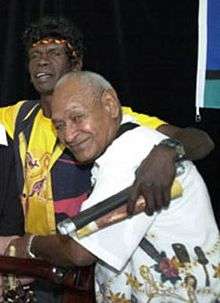George Rrurrambu Burarrwanga
George Rrurrambu Burarrwanga (1957 – 10 June 2007,[1][2] known in life as George Rrurrambu and George Djilangya), a Yolngu man born in the remote homeland of Matamata in the ceremonial women's birthing area under a tree, like many babies from generations before him. He was then raised in the community of Galiwinku on Elcho Island, Arnhem Land. An icon of Aboriginal rock music, he is best known as the charismatic frontman of Warumpi Band.
George Rrurrambu Burarrwanga | |
|---|---|
 Burarrwanga (left) with Seaman Dan (right) in 2002 | |
| Background information | |
| Birth name | George Rrurrambu |
| Also known as | George Djilangya |
| Born | 1957 Elcho Island, Northern Territory, Australia |
| Origin | Papunya, Northern Territory, Australia |
| Died | 10 June 2007 (age 50) Elcho Island, Northern Territory, Australia |
| Genres | Rock, Aboriginal music |
| Occupation(s) | Musician |
| Instruments | Vocals |
| Years active | 1975-2007 |
| Labels | Powderworks Records, Festival/Parole |
| Associated acts | Warumpi Band |
Burarrwanga's musical career began as a child through the education of Ancestral Song Lines which his father, Charlie Matjuwuy Burarrwanga, mastered in depth of historical knowledge, pitch, tone and feeling. Matjuwuy was to become the most respected and sought-after Yolngu ceremonial singer across Australia's Indigenous communities until his death in 2018 in his 80s. At the NT Indigenous Music Awards 2004, Rrurrambu was inducted into the NT Hall of Fame.
During the late 1970s, leaving behind the seashores for the desert community of Yuendumu, Rrurrambu married Felicity Robertson and became fluent in the Walpiri language and law as if he were "learning like a baby". He and Felicity had their first child, Glenda, who is a revered healer and strong advocate for the rights of community members struggling with mainstream culture.
Yuendumu is closely located to the community of Papunya, where families of both communities regularly visit one another. It was on one of these visits where George was to encounter two brothers: Sammy Butcher and Gordon Butcher, together with Neil Murray, musing over backyard arrangements without the confidence of a singer.
Oral history, from George recalling these initial meetings, was how clearly his lead singer's role was destined in the founding of Warumpi Band. In the meantime, Neil Murray's comfort amongst the Butcher Brothers was suddenly displaced by Rrurrambu's talent, tenacity, and blinding charismatic presence ... all of which was needed to take the world by storm, which was something even Murray couldn't resist.
In 1983, they released the single "Jailanguru Pakarnu" (Out of Jail),[3] the first rock song ever released in an Australian Aboriginal language.[4]
Three albums, Big Name No Blanket (1985), Go Bush (1988) and Too Much Humbug (1996), followed, including the anthemic songs "Blackfella/Whitefella" and "My Island Home", the latter of which was made famous when it was covered by Christine Anu in 1995.[4]
Burarrwanga performed at a number of major music festivals, including WOMADelaide, the Melbourne International Arts Festival, the Adelaide Fringe Festival, and the indigenous music events Stompen Ground in Broome and the Garma Festival in Gove.
After the break-up of the Warumpi Band, Burarrwanga launched a lower-key solo career, performing to sellout crowds at the Festival of Darwin and appearing live on national television for the Yeperenye Federation Festival in Alice Springs during 2000. He then launched a solo reggae album, touring throughout the Northern Territory and then to Europe in 2002.
Throughout his career Burarrwanga was active in promoting reconciliation and cross-cultural understanding between black and white Australians. In later years, Burarrwanga largely returned to traditional Aboriginal life, attending funeral and circumcision ceremonies with his father, a Gumatj clan leader. He was a proponent of combining the technical experience of white Australia with the knowledge of the land of the Aboriginal people to achieve more successful outcomes.
After his death at the age of 50 in 2007, he became known as George Burarrwanga for cultural reasons.[4] Recently, his original Yolngu name has returned to use - the liner notes to the Warumpi Band 4 Ever box set refer to him as George Rrurrambu Burarrwanga.
References
- "Former Warumpi Band frontman dies". ABC News. 10 June 2007. Retrieved 26 January 2020.
- "Father of Aboriginal rock remembered in traditional ceremony". ABC News. 11 June 2007. Retrieved 26 January 2020.
- "Warumpi Band on australianscreen online". Retrieved 3 March 2011.
- "Lead singer of Warumpi Band dies". Sydney Morning Herald. 11 June 2007. Retrieved 18 July 2007.
External links
- "Archived copy". Archived from the original on 15 June 2005. Retrieved 29 June 2007.CS1 maint: archived copy as title (link) of MusicNT.com: George Rrurrambu. Accessed on 29 June 2007.
- Warumpi Band Info in German
- Obituary, The Independent, 18 June 2007
- Obituary, The Times, 30 June 2007
- Obituary, The Guardian, 19 July 2007
- Listen to an excerpt of 'Jailanguru Pakarnu' and read more about it on australianscreen online
- 'Jailanguru Pakarnu' was added to the National Film and Sound Archive's Sounds of Australia registry in 2007